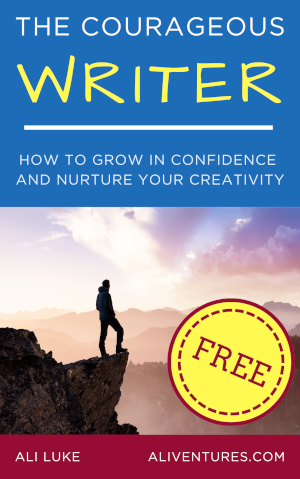What Can You Write About if You Don’t Have Any Ideas?

This post was originally published in November 2018 and revised and updated in June 2024.Sometimes, you might want to write – but you don’t know what to write about. You’re out of ideas.
Whether you’re working on blog posts, novels, short stories, freelance article pitches, or something else entirely, you need ideas. And you might have times when it feels like fresh ideas are in very short supply.
Perhaps you could come up with an idea if you truly had to – but it wouldn’t necessarily be something that interests you enough for you to devote valuable writing time to it.
When I’ve finished one big writing project, like a novel, I often feel empty of ideas. So much of my creative energy has gone into the work I’ve just finished, it feels like I’ll never have any more ideas that I like as much.
Having gone through this several times now, I know that a new compelling idea will eventually come to me! It’s just a matter of time. I don’t need to worry that I’ve come down with some incurable case of writer’s block.
But if you’re in that situation too, what can you do to fill the time while you’re waiting for that new idea? Or how can you help it along?
At this point, I could give you a long list of writing prompts: a hundred things to write about to pick from at random. I do think writing prompts can be helpful (and we’ll come onto some good sources of them later) … but, probably, you’re more interested in finding an idea of your own, one that really grabs you, not some ready-made idea from me.
Here are some things to try.
#1: Start Writing Shorter Pieces
You don’t necessarily have to be fully committed to an idea to write about it. You could simply list a whole bunch of ideas and see if any of them seem like halfway decent contenders.
Understandably, you won’t want to commit hours and hours to an idea that you’ve picked for the sake of having something to write. You might be happy to write a short story or piece of flash fiction, though, or a really short blog post – every word you get down on paper is good practice.
Plus, your idea might end up grabbing you more than you expected: some of my novels and novel-attempts started life as short stories. If you find that exploring your idea helps make it more engaging, you could expand and develop it into a much longer piece.
Further Reading
Short Story Competitions: Are They Worth Entering? Ali Luke, Aliventures
How to write a short story, Jenn Ashworth, National Centre for Writing
#2: Enjoy Other People’s Creations
Have you been so busy with your writing that you’ve struggled to find the time or energy to read? When you’re between writing ideas, that’s a great opportunity to enjoy the work of other writers (and artists and musicians).
Immersing yourself in other people’s creativity may well spark ideas of your own. You might lose yourself in a great novel, sink into a piece of beautifully crafted non-fiction, wander around an art gallery, or listen to an album by your favourite musician or band. Keep a notebook handy, just in case anything comes to you.
Further Reading
Re-Filling the Creative Well, Alysha Welliver, Scribbler
How to Read Like a Writer, Sean Glatch, Writers.com
#3: Take a Writing Course or Class, or Join a Writers’ Group
Whether it’s a two-hour workshop or a weeks-long programme, a creative writing course or class can be a great way to meet fellow writers, to learn new skills, and to explore new types of writing that you might not otherwise have considered. Just being around other writers, and setting aside time for writing, can help you feel more engaged with your writing life again.
Another great option is to join a writers’ group. Even if you don’t have anything to contribute for critique to begin with, simply reading other people’s work and chatting with other writers about writing could help you feel more inspired. There are plenty of writers groups out there: you could look for a local in-person group or join an online one.
Further Reading
Why You Should Join – Or Start – a Local Writers’ Group, Ali Luke, Aliventures
Creative Writing Classes: Are They Really Worth It? Abi Wurdeman, Dabble
Want the Support of Other Writers? Join the Aliventures Club on Facebook
If you’ve ever bought an Aliventures product (any guide, course, etc that I sell) then you’re automatically entitled to free lifetime membership of the Aliventures Club on Facebook. It’s a private group of writers where you can chat about writing, tell us how you’re getting on, keep us posted on your writing goals, and share work-in-progress.
#4: Explore the Ideas You DO Have
Perhaps you already have a potential idea or two – but you’re holding back. You might feel that you’re not “ready” to tackle a particular idea, but what’s the worst that could happen if you give it a go? Your idea won’t be wasted. Even if you can’t fully do it justice immediately, spending some time exploring it could put you in a better position in the months or years to come.
If you’ve got some half-formed ideas, set aside some focused time to explore them – maybe in your favourite coffee shop. You might find that you come up with a new angle or development that really interests you. Or you might end up going in a whole new direction, sparked by something incidental in the piece that you create.
Further Reading
How to Choose and Develop a Writing Idea [With Examples], Ali Luke, Aliventures
Prewriting Strategies, Excelsior Online Writing Lab (tip: follow the links in the list of ways to develop ideas for information on each technique)
#5: Try Some Writing Prompts or Exercises
If you’re still struggling to find or engage with an idea, go ahead and turn to a writing prompt … but try to pick one that’s general enough to give you plenty of scope for your own thoughts.
There are loads of online resources (and books) that offer writing exercises or prompts to try.
Here are a couple to check out. Both of these avoid the trap that some prompts fall into by giving you a reasonable amount of scope for each prompt:
30 Non-Fiction Writing Prompts
Decide how long you’re happy writing for (just five or ten minutes is fine). Even if you don’t want to go any further with that particular piece, everything you write is good practice.
If you find those prompts are still a little too directive, here are a few generic ones you might want to try:
Ready-Made Ideas for Fiction Writers (Short Story or Novel)
Write about…
- The most recent novel(s) you’ve read. What did you enjoy, or not enjoy, about them? Were there any characters that particularly interested you, or plot points?
- An everyday object used in a sinister way.
- An unusual family tradition (real or imaginary).
- Something that scares you (however irrational the fear).
Ready-Made Ideas for Non-Fiction Writers (Article, Blog Post, Etc)
Write about…
- The three things you found most baffling when you were a beginner in your chosen field.
- The technical terms / jargon in your field – you might create a glossary.
- A review of a recent book in your field – what was good and what was not so good about it? Would you recommend it?
- A controversial topic, or one where people in your field commonly disagree – give both sides of the argument.
Still Stuck on What to Write About?
Some writers feel that they can’t do anything at all until they find inspiration.
But I find that often, the inspiration comes once I start getting some (any!) kind of words down on the paper. That might mean grabbing a prompt and running with it … but it could also mean doing some brainstorming or making lists of possible ideas.
Try giving yourself a set length of time (15 minutes is long enough) and simply sitting with a blank piece of paper. Jot down as many thoughts as you can that relate to your writing project.
Those might be topic ideas for your blog, thoughts based on personal experience, pictures you have in your mind, a political issue you feel strongly about, a fictional character who seems to be hovering on the edge of your awareness … or anything else that comes to you.
As you get words down on the page, you might start to identify the start of an intriguing idea (or at least broad writing topics that you want to explore further).
The thing is, those ideas generally won’t come while you’re just sitting waiting for inspiration. So make the time to write even if you think you don’t have a clue what to write about. You might be surprised by what comes to you.
Join the Aliventures Newsletter (Free Ebooks!)
If you’d like more help figuring out what to write about and building a writing practice, make sure you join the Aliventures newsletter (it’s free)! You’ll get my free mini-ebooks Time to Write and The Courageous Writer to help you find both the time and the courage to write … and you’ll also get a weekly dose of writing inspiration every Monday.
About

I’m Ali Luke, and I live in Leeds in the UK with my husband and two children.
Aliventures is where I help you master the art, craft and business of writing.
Start Here
If you're new, welcome! These posts are good ones to start with:
Can You Call Yourself a “Writer” if You’re Not Currently Writing?
The Three Stages of Editing (and Nine Handy Do-it-Yourself Tips)
My Novels

My contemporary fantasy trilogy is available from Amazon. The books follow on from one another, so read Lycopolis first.
You can buy them all from Amazon, or read them FREE in Kindle Unlimited.


0 Comments